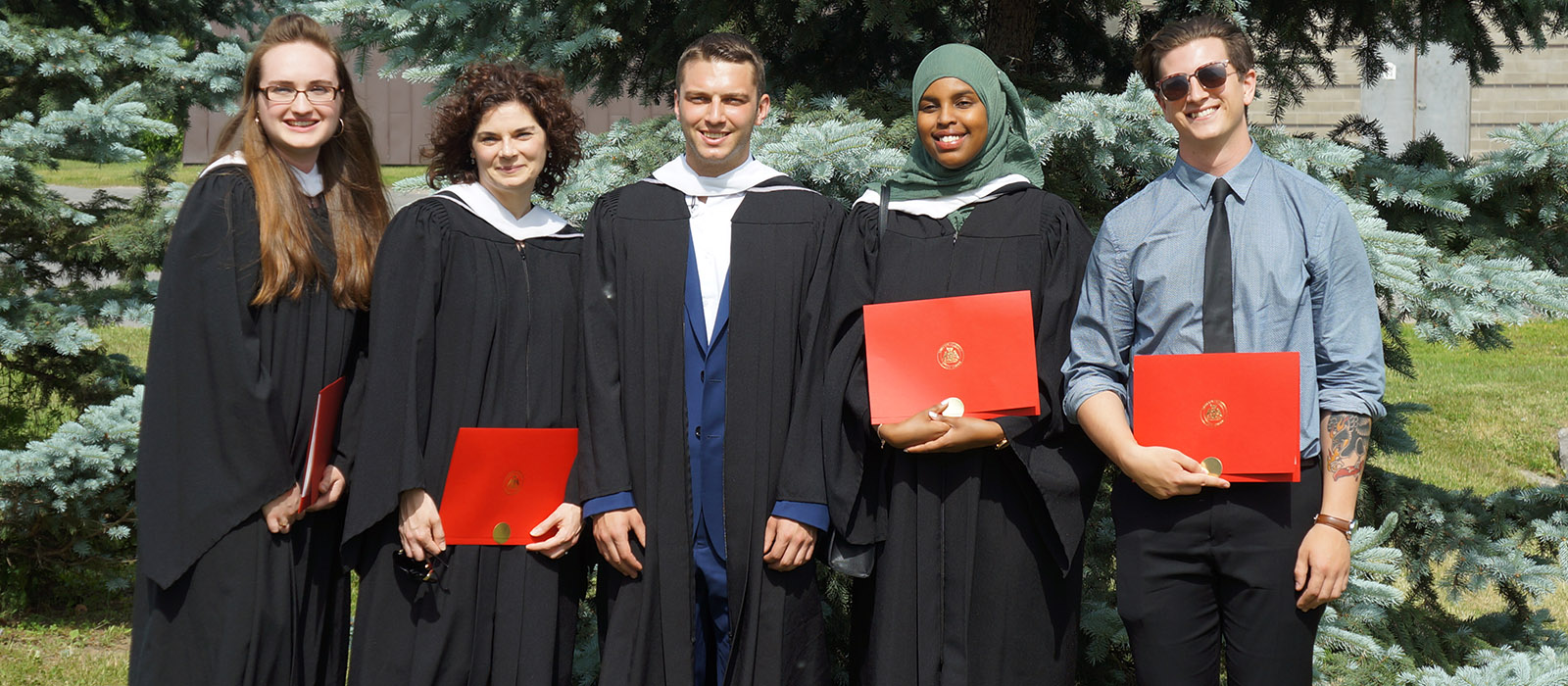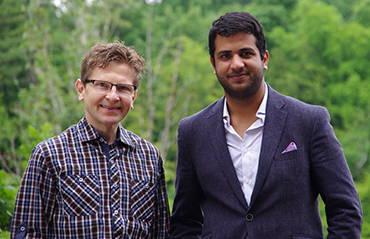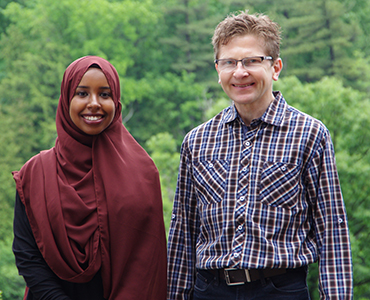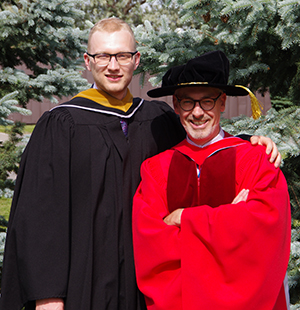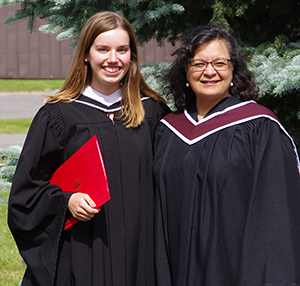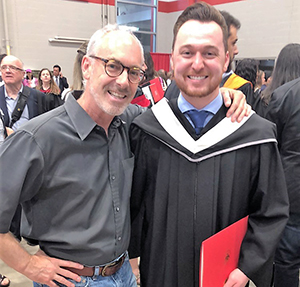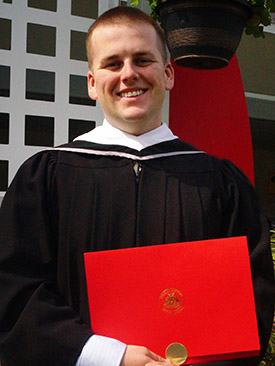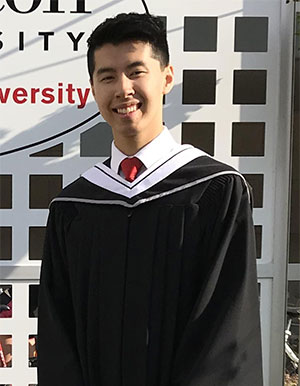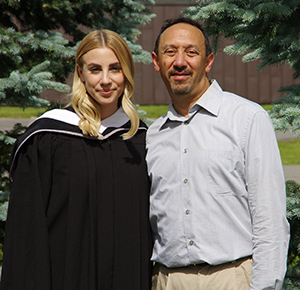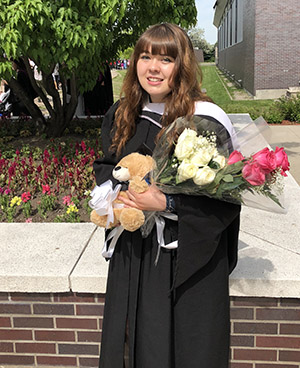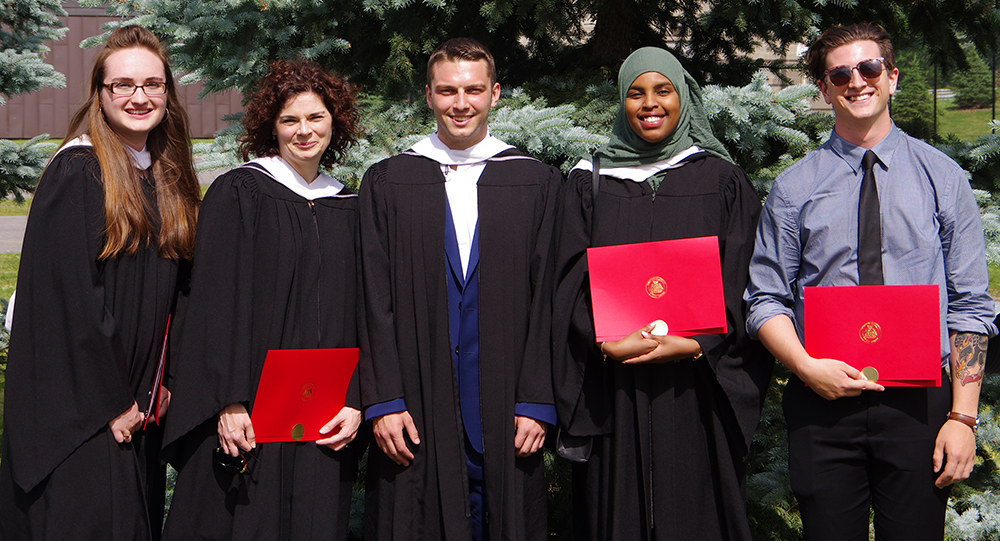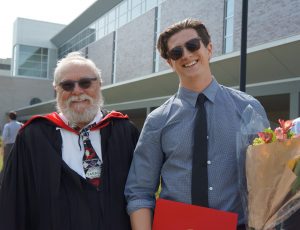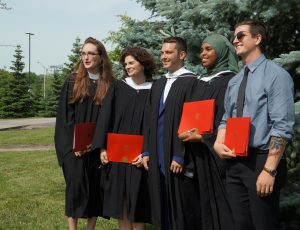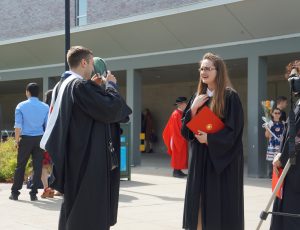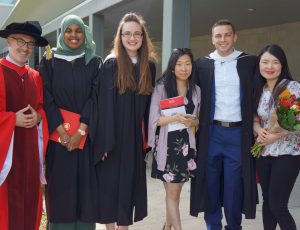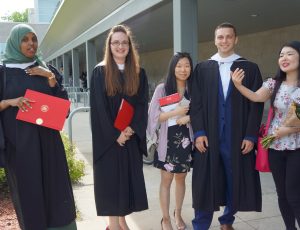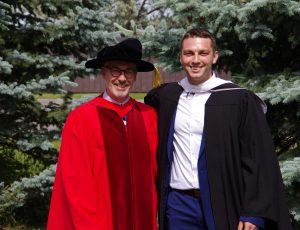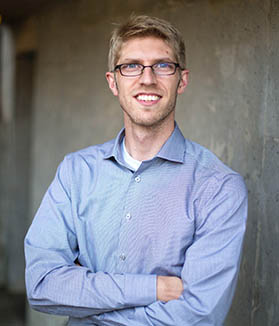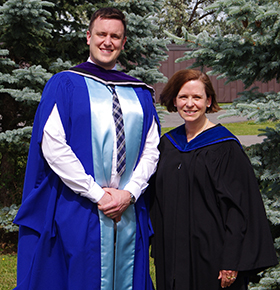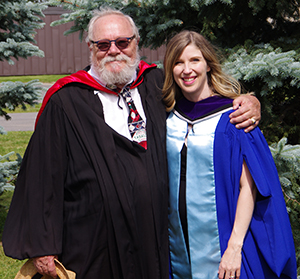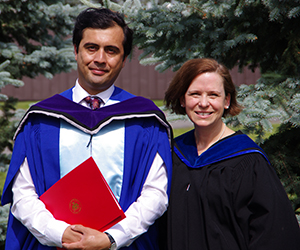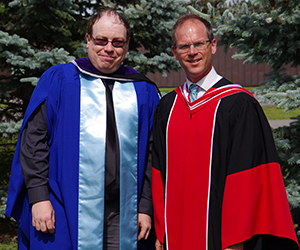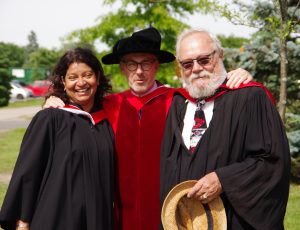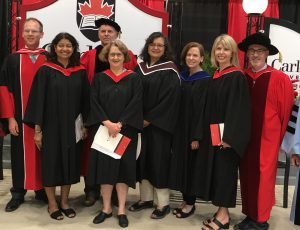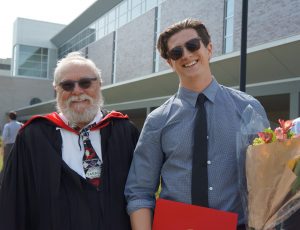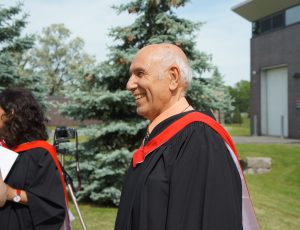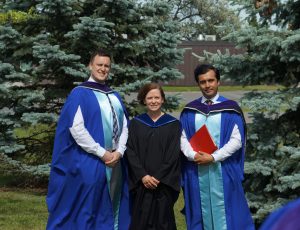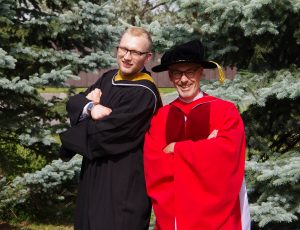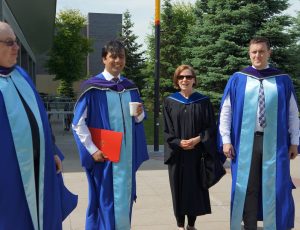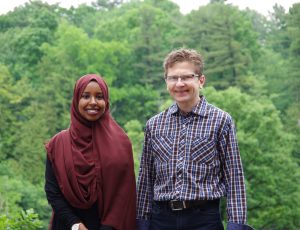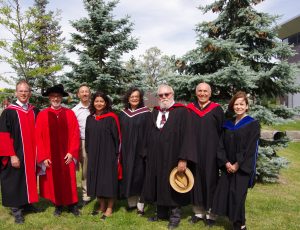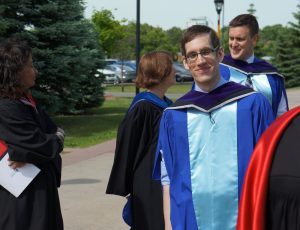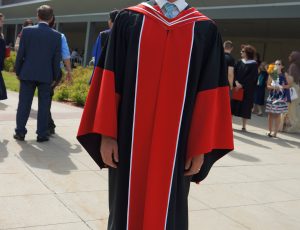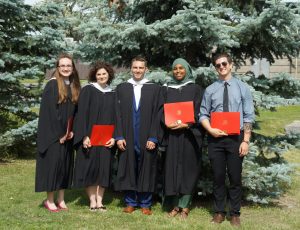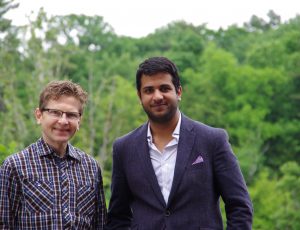Congratulations to our recent graduates! Here we would like to introduce you to some of our recent BA, MA and PhD graduates, and highlight some of their research stories. Following is a slideshow of our faculty and students on convocation day.
BA’s who have completed an Honours Research Essay
Micaal AhmedUp Against the Odds: the Battle to Maintain International Peace and Protect Human Rights by The United Nations I have been fascinated with the United Nations since my childhood. Its noble goals and ambition to make the world a better place even made me hope to work for the organization someday. However as I went through my undergrad and learnt more about the UN, I was often disappointed. I saw that in many attempts of maintaining international peace and security and protecting human rights the United Nations had failed. Reading about the international and civil conflicts in Kashmir, Israel-Palestine, Rwanda, and the Persian Gulf I wanted to find out just what had gone wrong with the United Nations in the past, and to investigate the reasons behind these failures. In my HRE, I therefore examined the UN’s role in two cases – the Rwandan genocide (1994) and the Iran-Iraq War (1980-88) – in light of different theories of international organizations to find an answer to my question. I reached the conclusion that the causes of the UN’s failures are multi-faceted: not only have the Great Powers which run the organization been so focused on their own needs and benefits that they have prevented the organization from achieving what it stands for, but the UN’s own bureaucratic features and mismanagement have often also caused more damage than good. As I finish my Journalism and Political Science degree and start working at iPolitics, I still aim to work for the United Nations someday after completing law school. However, my HRE with its criticisms of the organization has given me a better perspective on that dream. |
Ebyan AliA Comparative Analysis of the Rwanda and Bosnia Genocides in Canadian Broadcasting Media My HRE analyzes Western media representations of the Rwanda and Bosnia genocides in the 1990s, primarily focusing on Canadian broadcast coverage. It finds that Canadian news broadcasts framed both genocides, and especially the Rwandan one, in racially and culturally biased narratives of “savagery,” tribalism, apocalypse, and “white savior.” I first became interested in this topic in a Human Rights course in my second year which left me shocked about the lack of international response to the Rwanda genocide. Other Political Science courses further motivated me to research this topic. Scholarly work on Western media portrayals of the genocide particularly piqued my curiosity, though work on Canadian news coverage was lacking. My HRE was a first step to fill this research gap which confirmed that Canadian coverage showed biases similar to other Western media. In general, I am passionate about politics in the developing world, especially in Africa, along with the study of forced migration and refugee issues. I aspire to gain work experience in this field and hope to have the opportunity to help those living in conditions of war and forced migration. |
Jacob AllinSocial Media: The Changing Nature of Politics and Political Communication Jacob Allin recently completed his undergraduate degree in Political Science at Carleton, and he will pursue graduate studies at Western University. The culminating element of his degree was his Honours Research Essay that explored the use of social media in politics and political communication. Jacob’s ambitious and innovative essay explored every major aspect of the uses and implications of social media in politics and political communication. Apart from the conclusions concerning the main themes of the paper, many secondary findings emerged relating to such things as which social media are used by politicians at different levels and what are the usage differences between right and left wing users. Beyond the obvious topical importance of this research, it points to some of the basic aspects of interaction, behavior and personality that are part of the fabric of democracy. This paper was done against a rich background of personal enterprise and involvement in politics and communication. Jacob has been an active political consultant and organizer for a number of years, and he has also been an international observer at an American political convention. This paper began under the guidance of Professor Conrad Winn and ultimately involved supervision by Scott Edward Bennett. Professor Andre Turcotte was involved in the evaluation of this paper. |
Peter BrownAmerican Economic Hegemony and the World Trade Organization The central theme of this Honour’s Research Essay is the past, present and future relationship between the United States, the World Trade Organization (WTO) and the Multilateral Trading System (MTS) more generally. This paper suggests that many of the challenges facing the WTO and the MTS must be understood within broader themes of the International Political Economy (IPE), including shifting power relations, the challenges of global governance, and the role of the economic hegemon in directing, supporting, and enforcing the multilateral trading system. The paper examines the future of the MTS under the impact of broader global political and economic change. I build on existing theoretical foundations in in IPE to understand if the rise of China together with regional and bilateral trade agreements signal a retrenchment in U.S. leadership within the WTO, and more broadly a fundamental shift in the global trading system. My preliminary conclusions suggest this may indeed be the case. Further research is required to understand the impact of geopolitical and economic shifts on the WTO and the MTS, and whether potential risks to the MTS can be mitigated to avert a collapse of the system. Supervisor Randall Germain says of Brown’s HRE: Peter Brown is one of the final BA in Global Politics students to graduate. His GPOL degree includes a double major with Economics, and his HRE reflects his interest in how the global trading system is organized and operates. His research blended political with economic analysis, and provides a synthetic overview of the state of the multilateral trading system today. Peter was a wonderful, independent and self-starting student to supervise, and his HRE was a strong research effort that earned a first class grade. He is now off to graduate school, where I am certain he will thrive. |
Laura GreenComparative Multi-Level Perspective Analysis: Community and Cooperative Renewable Energy in Germany and Ontario Municipal governments and civil society organizations are increasingly playing a substantial role in climate change mitigation efforts, including the deployment of renewable energy technologies. My honours research essay utilizes the multi-level perspective developed in socio-technical transitions literature to comparatively examine the emergence of community based and cooperative renewable energy sectors in Germany and Ontario. Analysis of the varied landscape, regime and niche dynamics in each jurisdiction helps to explain why Germany’s community and cooperative renewable energy projects have experienced significantly more success than similar initiatives in Ontario. |
Matthew HealeyDoes the ‘Responsibility to Protect’ Protect Rwanda? In this Honours Research Essay (HRE), Matthew Healey explores the origins and effects of the ‘Responsibility to Protect’ (R2P) statement issued by the United Nations General Assembly in 2005, and endorsed by all UN members. Healey traces the origins of R2P to the international community’s response to genocide in Rwanda in 1994, and explores the different ways in which R2P protects vulnerable populations from the atrocity of genocide. One of the most innovative features of Healey’s HRE is the use of a ‘counter-factual’ to consider to what extent R2P might have altered the course of the Rwandan genocide if it had been in place in 1994. Healey concludes that although R2P might not have prevented the genocide, it would have altered its course and most likely would have prevented the full extent of the calamity being visited upon Rwanda’s Tutsi population. In other words, R2P is an important and positive change in the norms of international relations. Supervisor Randall Germain says of Healey’s HRE: ‘Matt Healey’s use of a counter-factual analysis demonstrates how Carleton students can employ novel and innovative research techniques in their studies. Matt exemplifies how inter-disciplinary study can pay off: the combination of coursework in political science with coursework in law and legal studies enabled him to bring many lenses to his analysis of R2P. It was a first-rate piece of research.” |
Rachel McLaughlinWomen & Descriptive Representation in Canada: The Joint Impact of Political Parties, the Electoral System and Political Culture on Female Candidates My Honours Research Essay situates the issue of women’s representation in the context of political parties, electoral system and political culture. I argue that Canada’s current political sphere contributes to the underrepresentation of women, diminishing the role of descriptive representation Parliament should provide. Following the existing literature, I employ a supply and demand framework in order to evaluate the interaction between the number of women who step forward to run (supply) and the number of women that parties either directly or indirectly support (demand). The supply and demand framework – a distinct but related set of decisions – explains the deficit in female representation. |
Josh MorencyWhere No Bomb Has Gone Before: How to Think About the Use of Digital Force and the Law of War Online In this paper, I attempt to examine and explain the impact that developments in applied sciences and technology have had on war. In doing so, I examine not only how the introduction of new technologies has changed the manner in which war is conducted, but also how technology has become a lens under which the idea of war itself is coloured. Focusing specifically on the role of technology in the historical evolution of the western tradition of war, I come to argue that, over the last century, a technological rationality arose as a means of harmonizing the conflicting paradigms of the strategic absolute and moral restraint in warfare. Further, in examining particularly the development of cyber warfare and autonomous weapons technologies by America and its Western allies, I argue that the technological rationality of western warfare has become its own self-reinforcing cycle, which has ultimately made the goal of the ideally-balanced war between strategic beneficence and moral duty harder to obtain and the security situation of the West even more delicate. |
Clive NganCanada as a Mosaic: An Analysis of Governing Parties’ Conceptualization of Canadian Multiculturalism Policy since 1963 My HRE featured both a quantitative and qualitative analysis of Canadian multiculturalism policy over the past 50 years or so. The analysis, which began in 1963, sought to determine the validity of the idea that Liberal governments have been more engaged in multicultural friendly activities than their Conservative counterparts. On the qualitative side, my paper analyzed the merits and consequences of each Prime Minister’s major achievements on the file. For instance, Pierre Trudeau’s 1971 Multiculturalism Policy adoption was studied as well as the passing of Brian Mulroney’s 1988 Multiculturalism Act. On the quantitative side, a number of key terms related to the file were tracked throughout various documents. These documents included Throne Speeches, Budget Speeches as well as any Prime Ministerial Statements on multiculturalism. By tracking the usage of these terms, the goal was to determine whether or not multiculturalism constituted a major priority for the government of the day. All in all, my findings demonstrated that there was indeed validity to the idea of Liberal governments being more multicultural friendly than Conservative ones. |
Sarah PainchaudThe ‘New Scramble for Africa’? US and Chinese Economic and Geopolitical Competition for African Oil and Gas Resources Sarah produced a thoughtful and well-researched essay on Chinese and US actions, and counter-actions, across Africa. China has become the most recent major player to expand its influence on the continent and seek a share of its vast natural resources. Sarah looked across time and space and considered Chinese—and American— actions to be “neo-imperial.” Multinational and state-linked corporations do the heavy lifting of extracting wealth from Africa, which differentiates the contemporary period from the European empire-building that occurred during the “Scramble for Africa” at the end of the nineteenth century. The United States and China are also as likely to collude as to compete, realizing that there is room across the continent for both of them to realize economic goals that will benefit their businesses and countries. The essay was beautifully written and Sarah’s examiner characterized as “formidable” her research base, which included documents from African, Chinese and US corporations as well as international non-governmental organizations. I greatly enjoyed working with Sarah to refine her arguments and appreciated her willingness to revise and improve through the sometimes-challenging but always-rewarding process. |
Julia ParsonsChanging the Operations of Partisans: How a Mixed-Member Proportional Electoral System Would Shape the Inner Workings of Political Parties in Canada Following the 2015 federal campaign, Prime Minister Justin Trudeau proclaimed that this would be the last election held under a first-past-the-post system. While the government has effectively stalled their own process of electoral reform, the issue of how Canadians elect their representatives is still of import to many citizens. My essay focuses on the impact that electoral reform could have on political parties if Canada were to change to a mixed-member proportional system. There has been much discussion in Canada regarding the use of mixed-member proportional as an alternative electoral system to the current model. My research primarily focused on comparing the experience in New Zealand, a country that recently switched to a mixed-member proportional system, to what Canada would likely experience if electoral reform of this nature occurred. I found that altering Canada’s electoral system would have a significant effect on the functioning of Canada’s political parties, as it would impact their candidate selection, election campaigning, how government formation would ensue and how party leaders are chosen. My essay concludes that with changes to these elements of political parties, the effects of a mixed-member proportional electoral system would have a lasting impact on Canadian democracy, as the country’s political culture is heavily reliant on political parties. |
Here are some of our MA graduates
|
From left to right Kimberley-Ann Meijer, Melanie Winzer, Matthew Jarrett, Hodan Moalim, Mason Krawczyk A few photos of our MA’s on convocation day: |
